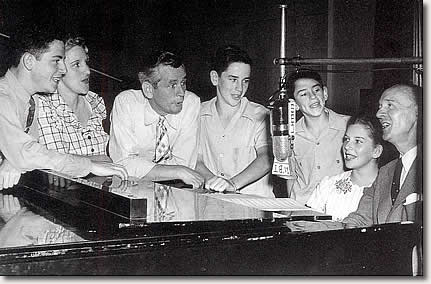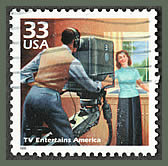
From 1942, Larry Walker was a fixture at WBT for 20 years. He was a superb musician, composer and entertainer who, among his many other accomplishments, mentored and accompanied the Rangers Quartet and the Johnson Family Singers.


From 1942, Larry Walker was a fixture at WBT for 20 years. He was a superb musician, composer and entertainer who, among his many other accomplishments, mentored and accompanied the Rangers Quartet and the Johnson Family Singers.
![]()
The following is excerpted from The Johnson Family Singers: We Sang For Our Supper by Kenneth M. Johnson, University Press of Mississippi, 1997, 126 pages. Reprinted with the author's permission.
During the early weeks of 1942, the [Johnson Family Singers] had our own WBT broadcast, a "sustaining slot" on Saturday mornings at ten o'clock. We still sang on the Sunday Morning Farm Club, from seven to nine, where we had started two years earlier, but gradually we began to branch out into programs of our own. That same year, a man from Florida who was to have a major influence upon our lives joined the station. He was also destined to put Charlotte's first two television stations on the air—WBTV and WSOC-TV—before his retirement in 1962 and his death in 1964. Larry Walker was a smiling, vivacious ex-vaudevillian.

Red (Kenneth), Ma, Pa, Bob, Jim, Betty, "Uncle Larry" Walker at the grand piano in the studio at WBT radio, Charlotte. (From the book.)
When Larry first came to WBT, he and his wife, Pat, were doing a live radio series for a Florida grocery chain which was fed to stations there. Larry also worked with the Rangers Quartet. By the end of 1943, the Johnsons and Walkers had developed a warm friendship. We also found ourselves being accompanied on the piano by "Uncle Larry."
Until the Walkers arrived, we sang only gospel songs. Larry Walker introduced us to popular music. Shortly after we met him, he was asked by the Charlotte Rotary Club to bring some talent from the station to perform at one of their meetings. When Larry spoke to the station manager, Jess Willard frowned, saying, "Larry, the Johnsons can sing only gospel songs." Larry responded, "Okay, Jess, I'll teach them a popular song!" The night of the Rotary program, the family made such a hit that the men demanded an encore. Knowing only one popular song, we sang it through again!
A native of Manning, South Carolina, Larry was the youngest son in a family of ten children, five sons and five daughters. He was a natural-born musician with perfect pitch; he could be riding along or walking, far away from any instrument, and, when asked to sound a certain key, could give the note instantly. We had never met anyone with this gift.
A winsome and enthusiastic personality, Larry Walker was also the epitome of kindness and patience. I never saw him lose his temper or speak angrily to anyone. Occasionally he would be afflicted with a splitting migraine headache, yet no one could ever tell it by the way he smiled and sang. "Aunt Pat" and "Uncle Larry" quickly became part of our extended family.
Larry's older sister Caro was practicing the piano one day when her youngest brother was only two and one-half years old. As the fifteen-year-old sister played, little Larry kept jumping in his mother's arms. "Get up, Caro, get up!" the mother finally told the daughter. "I think the baby wants to play!" Whereupon the mother put the little fellow on the piano stool, and he immediately played the same piece his older sister had been practicing!
When the young prodigy was sixteen, his piano teacher told the parents that she had taught him all she could. Larry was then sent to Troy, New York, for special study. Later he graduated from the Comstock Conservatory, during which time he composed music for the Ziegfeld Follies. Meanwhile, the talented musician/arranger had developed friendships and played with such celebrities as George Jessel, Edgar Bergen, Jack Benny, George Burns, and Sophie Tucker.
Larry was the only American student of Jan Paderewski, the great Polish pianist, who once said that Larry had perfect piano hands—each could cover better than an octave and a half! In addition to the four Ziegfeld Follies that Larry staged, he did a classical act for the Keith Circuit, which later became R. K. 0. He was introduced to his future wife, Pat, by Irving Berlin. Also included in his New York credits was a radio show for the fledgling CBS network.
At nineteen. Pat went to New York to do a musical show with Oscar Hammerstein II. From New York, she went on the R. K. 0. Orpheum Circuit, which took her to Los Angeles. While Pat was on the West Coast, Mr. and Mrs. Edward L. Doheny heard her sing. They invited her to their home and later paid her expenses for two years of study in Milan, Italy. Upon her return to the States, she did a year's concert tour before becoming a commentator and soloist for the Margaret Ann radio series.
One of Larry's sisters, Julia Bradham Brown (known to us affectionately as "Bumpsy") came to Charlotte with the Walkers in 1942. The youngest of the Bradham girls, she had been widowed by a naval officer the previous year. It was Julia who told me how, early in his music career, Larry had legally changed his name from Laurens Walker Bradham to the shortened Larry Walker. They had a deaf-mute brother who had graduated from Gallaudet College in Washington when Dr. Laurens Walker was president. In appreciation of Dr. Walker, the Bradhams named their youngest child after him; however, in show business Larry found that the surname caused difficulties with spelling and pronunciation.
In the early part of 1944, Larry moved from accompanying the Rangers Quartet to playing for my family, and he also sang with us, as did his wife on certain occasions. We marveled at the way this classical musician could "tickle the ivories" with all kinds of music! His piano not only complemented Dad's guitar but gave variety to our music. Larry helped us to learn ballads and popular songs, including "Sweetheart of All My Dreams," "Sweet Sue," "Apple-Blossom Time," "When You Wore a Tulip,"and "Rosemary" ... Mother's favorite, which she later taught our children, was "On Moonlight Bay."
Dad still had the musical limitations of his mentor, "Wink" Howard. Larry provided us with another dimension to our work, allowing us to be considered a variety-singing group rather than performers of gospel only. Within a relatively short period of time, we had broadened our repertoire in both radio and show appearances. From this time on, we were known as a variety-singing family. But we did not give up the gospel songs and hymns with which we had begun our career and which we considered our bread-and-butter music; we simply incorporated them into a larger body of work.
On December 15, 1946, the family joined Larry in a guest appearance with the Charlotte Symphony Orchestra in their Christmas concert at the old Armory Auditorium. This was quite a jump in our musicianship from log cabin days!
In addition to our music connection, the Walkers took a personal interest in us and our development, especially my sister and me. When they found that Betty didn't have any heat in her bedroom, they promptly bought a stove for her! We would visit them at their summer cottage in Blowing Rock, with its breathtaking view of the Smokies and the tiny crossroads of Globe down in the valley. Also, we met their friends and would go to parties and other places that they would arrange for us. The social graces to which the Walkers exposed us made us feel more confident as we grew up and widened our circles.
